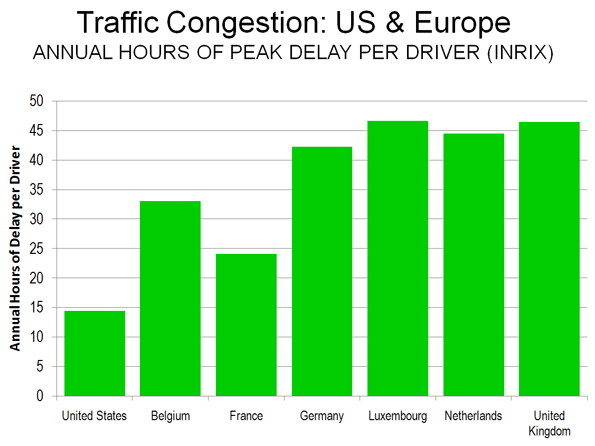A new international report indicates that traffic congestion in the United States is far better than in Europe. The report was released by INRIX, an international provider of traffic information in 208 metropolitan areas in the United States and six European nations.
The report shows that the added annual peak hour congestion delay in the United States is roughly one-third that of Europe. The rate of France was somewhat less than twice the rate of the US and rates in Luxembourg, the United Kingdom, Germany and the Netherlands were three times as high.
In the United States, peak period traffic congestion adds 14.4 hours annually per driver. This compares to an average delay per year of 39.5 hours for the European nations. Luxembourg, the United Kingdom, the Netherlands and Germany had the greatest lost time, at from 42 to 47 hours. Again, France scored the best in Europe, at 24.1 hours of lost time in traffic per year (Figure).

Among individual metropolitan areas. Los Angeles had the greatest peak hour delay, at 74.9 hours annually. Utrecht (Netherlands), Manchester (United Kingdom), Paris, Arhem (Netherlands) and Trier (Germany) second through sixth in the intensity of traffic congestion, all with 65 or more hours of delay per driver per year.
These findings are consistent with international data indicating that traffic congestion tends to be more intense where there are higher urban population densities.













My friend mentioned to me
My friend mentioned to me your blog, so I thought I’d read it for myself. Very interesting insights, will be back for more! North Royalton massage therapy
Various Ways to Measure Congestion Costs
Traffic congestion can be measured in various ways which lead to different conclusions about the magnitude of this problem and its solutions. The INRIX Scorecard and the Texas Transportation Institute's Travel Time Index measure the intensity of congestion for motorists, but do not account for the portion of total urban travel by automobile or average trip distances, and so fail to recognize the congestion costs that are avoided in cities with better transport options and shorter travel distances. A much better indicator is per-capita annual congestion delay, which tends to be lower in smart growth cities. For information see my recent Planetizen blog, "Threats of Gridlock are Greatly Exaggerated" (http://www.planetizen.com/node/48451 ) and Joe Cortright's report "Driven Apart: How Sprawl is Lengthening Our Commutes and Why Misleading Mobility Measures are Making Things Worse" (www.ceosforcities.org/work/driven-apart ).
Todd Litman is founder and executive director of the Victoria Transport Policy Institute (www.vtpi.org), an independent research organization dedicated to developing innovative solutions to transport problems.
The most obvious error
The most obvious error, of course, is that he gives numbers for time lost PER DRIVER, without mentioning that people are less auto-dependent in European cities.
The number one city in the world for time lost due to congestion is Los Angeles, where most people have no choice but to drive.
Number two for time lost due to congestion is Utrecht, Netherlands, where I would guess that as many people bicycle as drive, and the bicyclists do not lose time due to congestion.
The less obvious error is not made explicit in the article. However, I assume that his figures make the same error that the TTI figures do. They count time lost to congestion, but do not count time lost to longer distances. European cities have more congestion than American cities, but they also have shorter distances to travel.
It is plausible that time spent traveling is just as short in Europe as in America, or even shorter, but Cox's numbers do not look at this at all.
Charles Siegel
Hack!
Is Wendell Cox ever right or honest? No. This tool keeps on putting his nose into business he does not understand.
Who ever runs this site, having this guy greatly hurts your credibility. The Reason Foundation is the laughing stock of the Planning and Development world and he has been shown to lie about statistics in the past.
Shame on you for promoting such a hack!
J Hoff, it's quite alright
J Hoff, it's quite alright if you disagree with Wendell Cox, but please comment on what is wrong with his argument - don't simply say he doesn't know what he's talking about.
Can someone please paste a link to the report? The link provided is in french and is not a report.
Thanks.
EDIT -- Never mind, found it's the downloadable spreadsheet at the end of the paragraph!
Packers and Movers
packers and movers Bangalore
packers and movers delhi
packers and movers mumbai
Great blog
I like this very much
packers and movers Noida
packers and movers faridabad
packers and movers ghaziabad
packers and movers noida